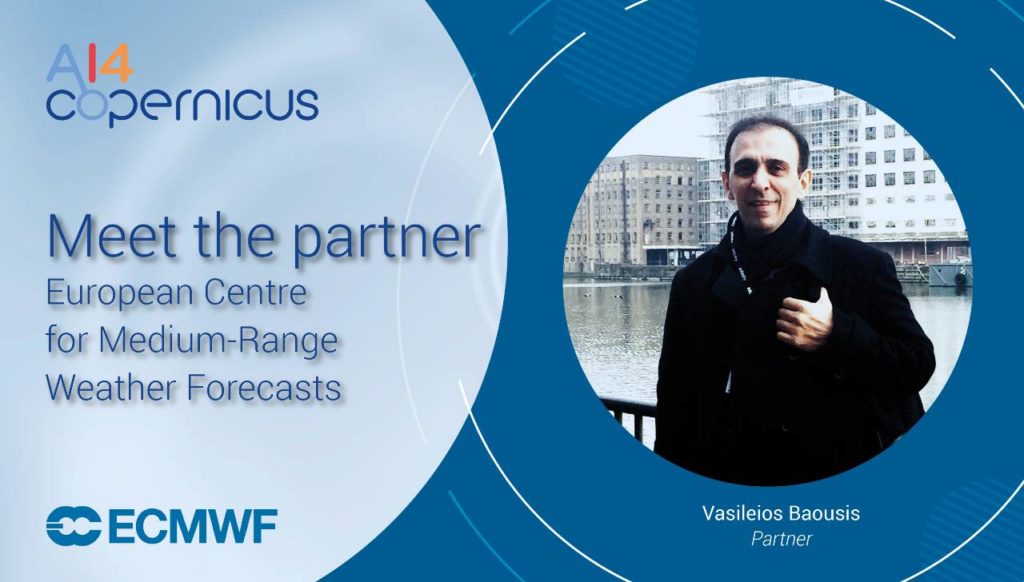Meet the Partner
Every week in this section, we will present our AI4Copernicus partners and their distinct role and work within the project.
The National Center for Scientific Research Demokritos
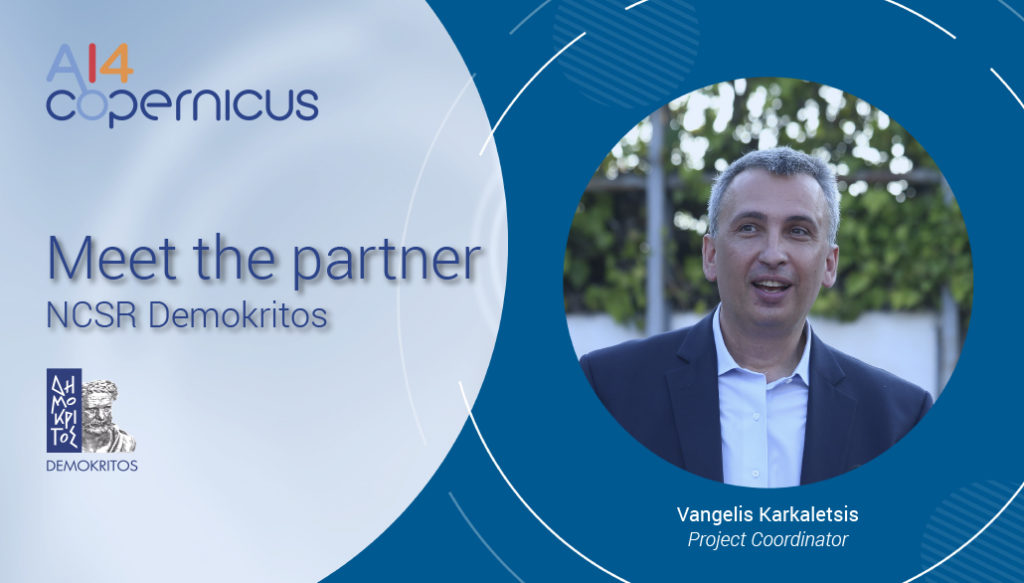
The National Centre for Scientific Research Demokritos (NCSR Demokritos) is the largest Greek self-governing research organisation under the supervision of the General Secretariat for Research and Technology (GSRT) of the Greek Government. NCSR Demokritos participates with the Software and Knowledge Engineering Lab (SKEL | The AI Lab) of its Institute of Informatics and Telecommunications.
SKEL | The AI Lab has participated in and coordinated numerous national and European projects and has substantial expertise in the areas of Artificial Intelligence, big data management, content analysis, e-infrastructures, personalisation and human-machine interaction. Since its inception, SKEL has a strong focus on Artificial Intelligence, with its research activities covering a broad range of Natural Language Processing and Content Management and Analysis areas. Its outcomes on diverse fields like Machine Learning and Knowledge Representation have been applied to critical problems in societally important sectors like Health, Culture, and Maritime.
Role in the Project: Dr. Vangelis Karkaletsis is the project coordinator leading WP1 Project Management, as well as WP6 Technology Transfer via AI4Copernicus Open Calls having the responsibility of planning and managing the open calls. Ahedd DIH and NCSR Demokritos will support the Open Calls tasks. NCSR Demokritos is a technical contributor for AI services and resources in WP3, WP4 and WP5 and also responsible for the dissemination and communication activities in WP7.
Partner Website: https://www.iit.demokritos.gr/
National and Kapodistrian University of Athens (NKUA)
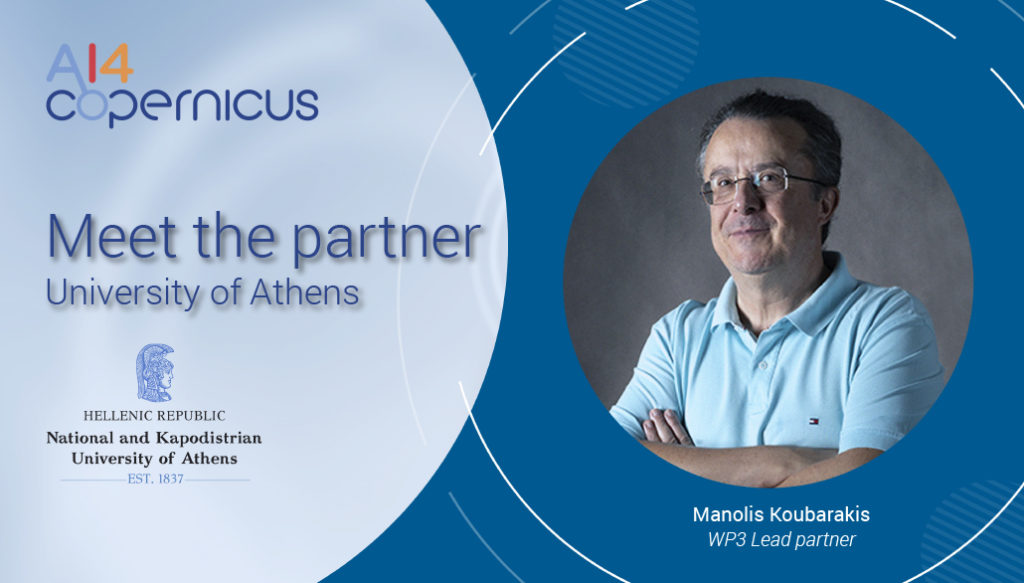
The National and Kapodistrian University of Athens (NKUA) participates in AI4Copernicus with the Artificial Intelligence team led by Prof. Manolis Koubarakis. Since 2010, the NKUA team has been the leading European team in applying semantic technologies to Earth Observation data. This work has been funded with more than 4M euros by the European Commission.
Role in the project: As the lead partner in WP3: Technical positioning and architecture, the contribution of NKUA in AI4Copernicus will be the development of a question-answering engine for discovering Copernicus datasets using natural language questions and the development of the Copernicus Knowledge Graph, the first knowledge graph encoding knowledge about the Copernicus programme. Additionally, NKUA is going to lead the design of the software architecture of AI4Copernicus and its interfaces with CREODIAS, WEkEO and the AI4EU platform, and at the same time will position AI4Copernicus in the European AI and Copernicus ecosystems.
Partner website: http://ai.di.uoa.gr/
Thales Alenia Space (TAS)
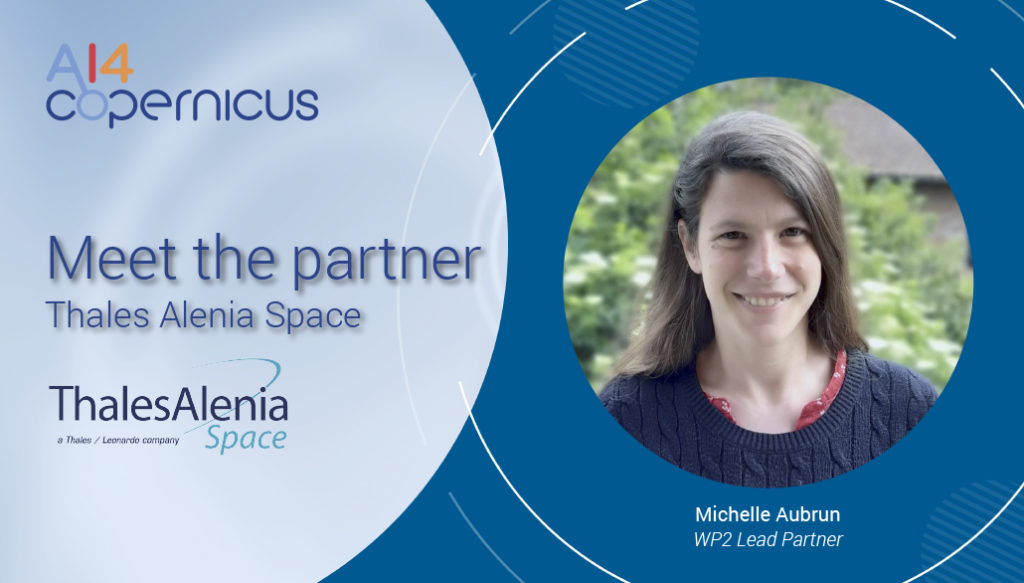
Thales Alenia Space is a global space manufacturer, a joint venture between Thales and Leonardo, delivering, for more than 40 years, high-tech solutions for telecommunications, navigation, Earth Observation, environmental management, exploration, science and orbital infrastructures. Thales Alenia Space posted consolidated revenues of approximately 1.850 billion euros in 2020 and has around 7,700 employees in ten countries.
Thanks to our diversity of skills, talents and cultures, our customers (governments, institutions, space agencies, telecommunications operators), rely on us to design, operate and deliver satellite-based systems that help them position and connect anyone or anything, everywhere, help observe our planet, help optimise the use of our planet’s – and our solar system’s – resources.
At Thales Alenia Space, we help further the understanding of our planet by contributing to R&D activities especially for Earth Observation. For instance, our R&D teams develop scalable solutions based on artificial intelligence models to perform automatic and generic feature detection from satellite images allowing to minimize tedious eye-scanning of vast swathes of land and focus on tasks where human expertise is critical.
Role in the project: In the frame of AI4Copernicus project, TAS with Mrs. Michelle Aubrun, leads the WP2 ‘User requirements and acceptance’ with whose objectives are to collect the operational needs from users, to match them with AI4EU and project solutions, and to assess the impact of the project developments on the economy, society and environment. More specifically, Thales Alenia Space will describe user scenarios for the Open calls, specify high-level user requirements, and define approaches to validate the solutions developed. The partner contributes also to WP1 ‘Project Management’, WP3 ‘Technical positioning and architecture’, WP4 ‘Implementation, customisation, integration and testing’ and WP7 ‘Exploitation, Communication and Dissemination’.
Partner website: https://www.thalesgroup.com/en/global/activities/space
INSEAD
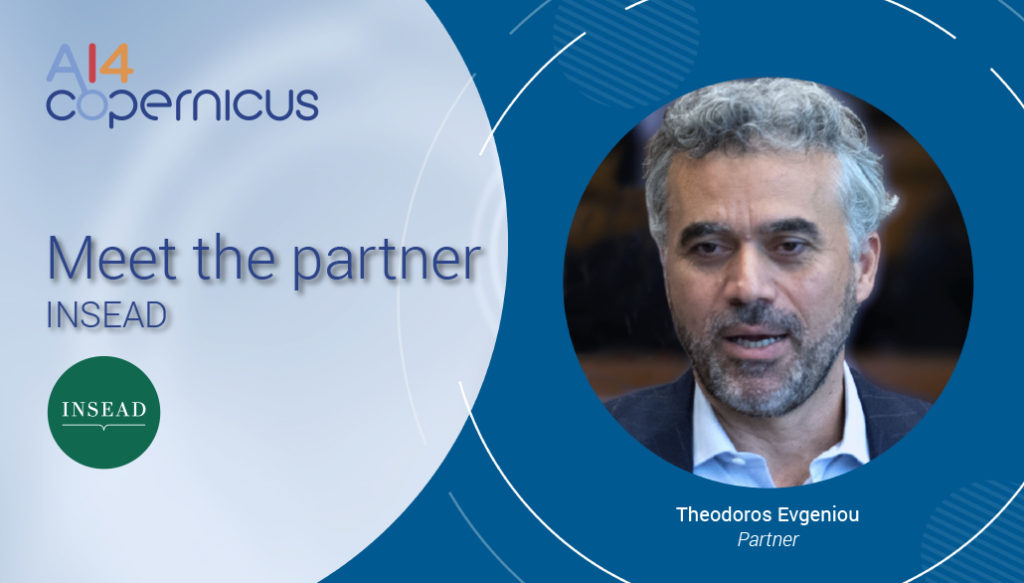
Founded in 1957 in Fontainebleau, INSEAD is one of the world’s leading graduate business schools. With campuses in Europe (France), Asia (Singapore), Middle East (Abu Dhabi) and alliances with top institutions, INSEAD’s business education and research spans around the globe. Its 149 renowned faculty members from 40 countries inspire more than 1.400 students in its degree and PhD programmes. In addition, more than 11.000 executives participate in INSEAD’s executive education programmes each year.
Role in the project: Prof. Theodoros Evgeniou leads the INSEAD team which contributes to WP2, WP6 and WP7, in the design and analysis of the business & policy aspects of the surveys to be conducted and by improving the understanding of the partnership concerning the barriers and challenges for adopting Artificial Intelligence technologies that leverage Copernicus and Earth Observation data. It participates in the collection of operational and business needs from users, and prioritise their feedback. This will allow to derive clear requirements for the solution design and implementation phases matching those with the services and tools made available and developed during the project.
Through these efforts, INSEAD will also provide input for the Open Calls published by the Consortium to support projects that can demonstrate the needs and the sustainability of the project. INSEAD will also participate in defining the approach and methodology for the prototype validation and evaluation with relevant stakeholders and end-users.
Partner website: https://www.insead.edu/
Thales Six (THA)
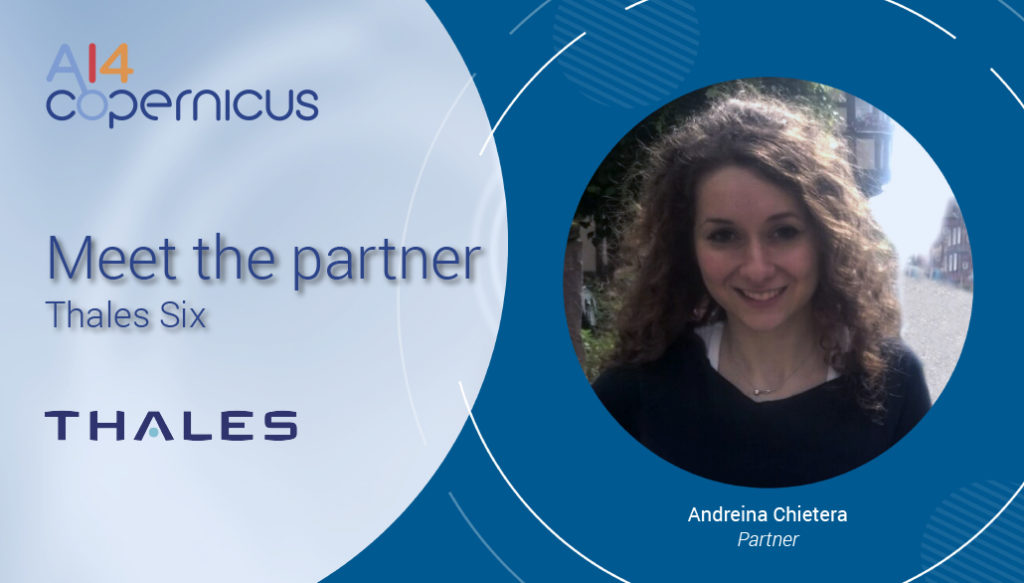
Thales is a leading international electronics and systems group, serving Defence, Space, Ground Transportation, Security, supported by a comprehensive services offering. The group’s civil and defence businesses develop in parallel to serve a single objective: the security of people, property and nations. Leveraging a global network of high-level researchers, Thales offers a capability unmatched in Europe to develop and deploy critical information systems. Thales Six is a subsidiary of the Thales Groups. As part of Thales SIX GTS’ research facility at the École Polytechnique campus in Palaiseau, near Paris, the Secure Communications and Information Systems Global Business Unit has created ThereSIS, a research laboratory dedicated to developing security technologies to protect people, property and critical information systems. ThereSIS aims to consolidate and expand this capacity to manage complex electronic systems used by millions of citizens.
ThereSIS innovation lab focuses on vision, autonomy and perception systems, network security and cyber protection, adaptive systems and bio-inspired simulation. The vision and sensing domain develops technologies dealing with video analytics, perception and robotics and is specialized in critical infrastructures monitoring and transportation.
Role in the project: Dr Andreina Chietera leads the Thales Six team which contributes to WP5 ‘Bootstrapping AI4Copernicus with high-impact services’. In the context of the agriculture use case, Thales Six will investigate the use of semi-supervised and self-supervised learning approaches for land classification in satellite image time series. In particular, the intent is to evaluate the temporal aspect through recurrent neural network models and infer the feature changes over time via a self-supervision approach coupled with a time series anomaly analysis.
Thales Six will be also involved in the WP2 ‘User requirements and acceptance’. In this context, Thales Six will investigate the AI tools already available for satellite data manipulation. This activity will end up on a report aiming to review the main software implemented on the DIASes, on AI4EU platform, but also in literature mentioning the main githubs that could be useful for the development of WP5. This analysis will lead to a classification on these tools on the basis of the domain of application, on the product type delivered and on the kind of AI approach they applied. Thales Six also takes part in WP7 ‘Exploitation, Communication and Dissemination’. Leveraging on the Thales Six role as Coordination of AI4EU, the partner will support AI4Copernicus activities with respect to integration with the AI4EU platform and exploitation.
Partner Website: https://www.thalesgroup.com/en
European Centre for Medium-Range Weather Forecasts (ECMWF)
ECMWF is both a Research Institute and a 24/7 operational service, producing numerical weather predictions for its Member and Co-operating States as well as users around the world. ECMWF carries out scientific and technical research and analysis aiming to continuously improve global prediction. ECMWF processes in its high-performance computing facility large amounts of observations to provide up-to-date global analyses and climate reanalyses of the atmosphere, ocean and land surface.
Over the years, ECMWF’s partnership with the European Union has grown, and in 2014 ECMWF became an entrusted entity to operate the Copernicus Atmosphere Monitoring Service (CAMS) and the Copernicus Climate Change Service (C3S) on behalf of the European Commission until mid-2021 and ECMWF is preparing plans for the next phase of the Copernicus Programme for the period 2021-2027. ECMWF currently operates from its headquarters, located in Reading, UK, and its data centre located in Bologna, Italy. Over the course of 2021, ECMWF will be opening additional new premises in Bonn, Germany. ECMWF has embarked on an exciting new initiative to explore the use of artificial intelligence and machine learning in applications of numerical weather predictions.
Role in the Project: Dr Vasileios Baousis leads the ECMWF team, which will contribute to WP5 Bootstrapping AI4Copernicus with high-impact services leading Task 5.4 ‘Health bootstrapping services and resources’. Also, in WP6 ‘Technology Transfer via AI4Copernicus Open Calls’ monitoring mainly the Open Calls on the health domain.
Partner Website: https://www.ecmwf.int/
University of Trento (UniTN)
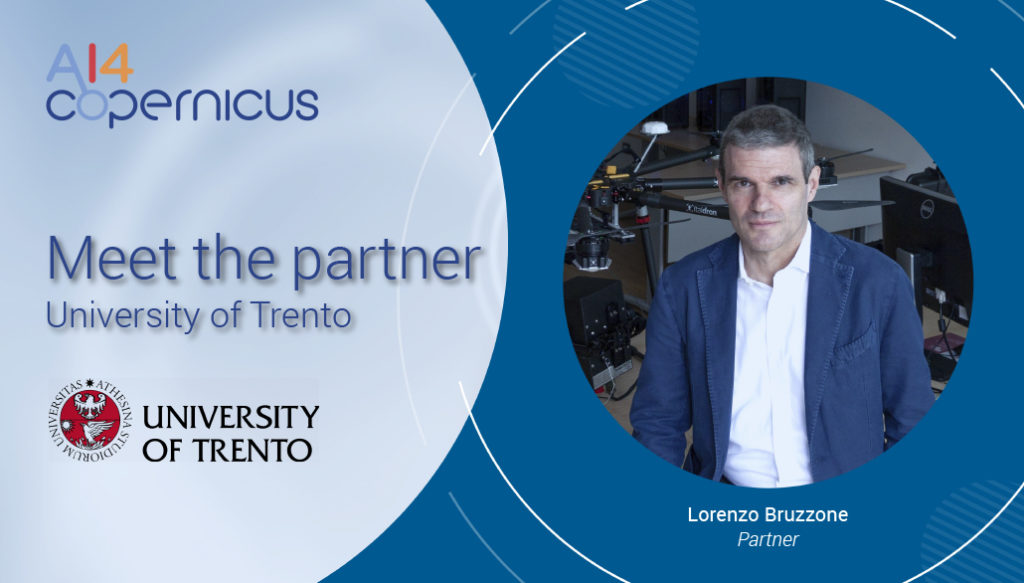
The Department of Information Engineering and Computer Science (DISI) of the University of Trento, Italy, was founded in 2002 and represents an aggregation of top researchers and institutions. The remote sensing and data processing expertise at DISI is related to the Remote Sensing Laboratory (RSLab) led by Prof Lorenzo Bruzzone. The RSLab has a long experience in the development of automatic and semi-automatic methods and algorithms for information extraction from remote sensing images acquired by both passive (multispectral, hyperspectral) and active (SAR for imaging, sounder, LiDAR). RSLab has a solid background and a huge experience in the definition, development, and implementation of techniques for estimation, classification, and data fusion with different kinds of remote sensing data. In this framework, the members of the laboratory developed many advanced techniques based on machine learning that are state-of-the-art for data analysis in remote sensing. The team has also matured experience in different projects. RSLab has been involved in more than 40 national/international projects related to the analysis of remote sensing data. These projects have been funded by the European Space Agency, the European Commission, the Italian Space Agency, and several other public and private bodies. The RSLab visibility at the national/international level is also documented by the high number of international awards and honors received by its members in the field of remote sensing and signal processing, by the high number of publications in the most prestigious international journals, and by the high number of citations received.
Role in the Project: Mr Lorenzo Bruzzone is leading the team of UniTN that will contribute to WP4 ‘Implementation, customization, integration and testing’ by leading Task 4.4 ‘Machine learning models for EO’ and in WP5 ‘Bootstrapping AI4Copernicus with high-impact services’ by leading Task 5.1 ‘Agriculture bootstrapping services and resources’. Also, UniTN will be involved in WP6 ‘Technology Transfer via AI4Copernicus Open Calls’ monitoring the Open Calls related to the agriculture domain.
Partner website: https://rslab.disi.unitn.it/
European Union Satellite Centre (SatCen)
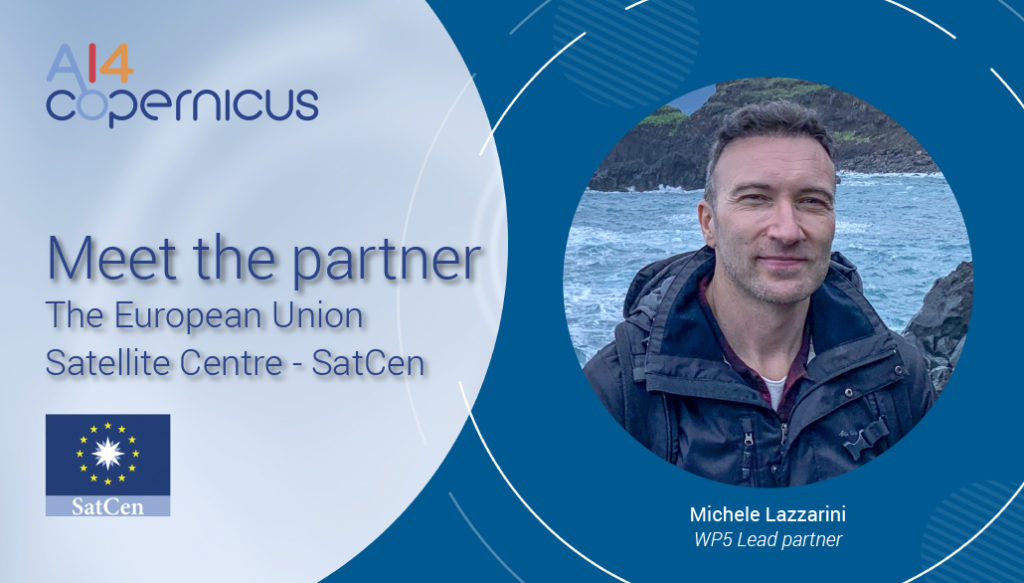
The European Union Satellite Centre (SatCen) is an Agency of the Council of the European Union (EU) working under the supervision of the Political and Security Committee and the operational direction of the High Representative of the Union for Foreign Affairs and Security Policy. SatCen is a key EU institution linking Space and Security, and a primary user of Earth Observation (EO) satellite data with great expertise in managing and disseminating products derived by the exploitation of satellite imagery and collateral sources. SatCen has a long experience in R&I projects in which new technologies and solutions to improve EO capabilities in the Space and Security domain are defined and developed. In particular, the activities related to the AI4Copernicus project fall under the RTDI (Research, Technology Development and Innovation) Unit responsibility.
RTDI Unit: The RTDI Unit aims to keep SatCen capability at the state-of-the-art. RTDI activities are organised in work streams encompassing the whole data lifecycle, such as New Data Acquisition Systems (e.g. HAPS, Small Satellites, RPAs, new sensors) Collateral Data (e.g. geolocation, OSINT, AIS), Secure Satellite Communications (e.g. EU GOVSATCOM), Innovative Technologies (e.g. Big Data, Artificial Intelligence, Machine Learning, Digital Twin), Cloud Computing (e.g. Interoperable Platforms) and EO based Applications (e.g. in SAR and in the optical domains). Moreover, RTDI activities focus on strengthening collaborations with other European and international entities (e.g. ESA and GEO), also exploring the interconnection of security with other domains (e.g. climate).
Role in the Project: Dr Michele Lazzarini is a member of the SatCen team, that is leading the WP5 Bootstrapping AI4Copernicus with high-impact services coordinating the activities of implementing services, mainly based on the exploitation of satellite images (e.g. Sentinel-1 and Sentinel-2), to create analysis-ready data and services for the open calls. Moreover, SatCen will manage the open calls related to Security (e.g. definition of tender specifications, evaluation of tenders, support to 3rd party to the technical implementation) in WP6 and support the institutional dissemination (WP7) and the collection of user requirements (WP2).
Partner Website: https://www.satcen.europa.eu/
Equinor
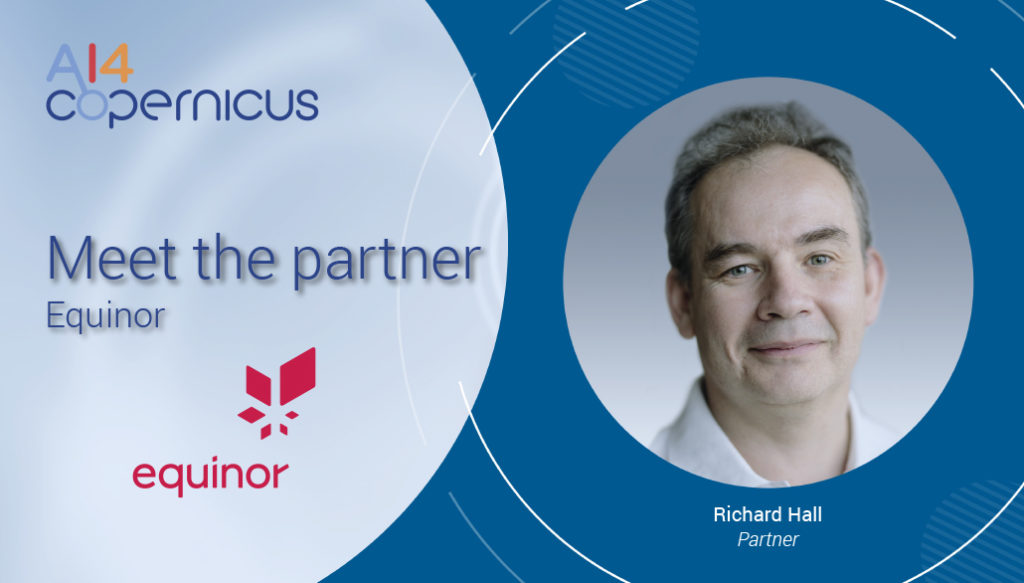
Equinor is an international energy company, and one of the world’s largest offshore operators. Every day Equinor delivers oil, gas and wind power to energise the lives of more than 170 million people. Equinor’s goal is to safely produce high value energy with a low carbon footprint for our customers. The key to this goal is digital innovation because Equinor knows that data can provide an extreme amount of answers, if we ask the right questions.
AI4Copernicus is a digital innovation project and fits very well into the TDI business area. Technology, Digitalisation and Innovation (TDI) together are fundamental enablers to improve safety, increase value creation, reduce emissions and develop low carbon solutions. AI4Copernicus will enable Equinor to learn and collaborate with domain experts to create new digital tools for exploiting the big Copernicus data sets with Artificial Intelligence tools. In addition, Equinor will get a good understanding how to use and collaborate on the AI4EU infrastructure.
Role in the project: Richard Hall, who leads the Equinor team that participates in the project, is a subject matter expert on satellite images and Earth Observation. Equinor’s role in the project is as a user, with specific responsibility for Energy applications. More specifically, Equinor will lead Task 5.2 ‘Energy bootstrapping services and resource’ in the context of WP5 and will be mentoring the open calls projects on energy in WP6. Equinor will ensure that the open calls related to Energy will address matters like proposing safe locations for building energy infrastructures, the optimisation of safe energy production and will track down fields where there is a demand for energy.
Partner Website: https://www.equinor.com/en.html
Blue-Sight Conseil
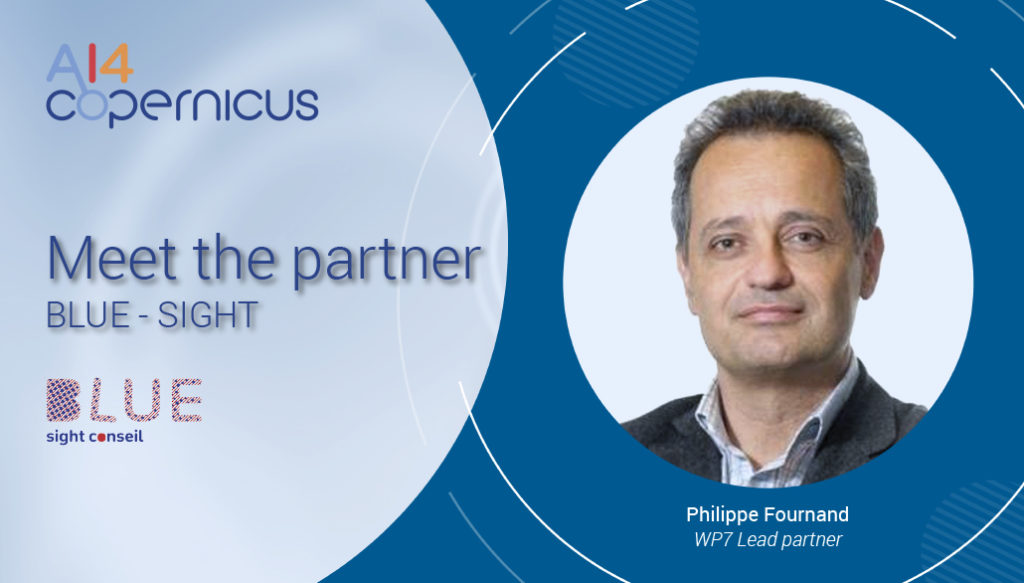
Blue-Sight is a European consulting firm specialised in the management of large-scale collaborative projects aiming at developing sustainable innovations for private and public stakeholders. The team has over two decades of experience in setting up and managing collaborative projects. Blue-Sight is working on strategic European projects, such as AI4EU, which aims at building the European platform for artificial intelligence. Its main services include advising innovation strategies, designing and managing collaborative projects and sustainable business models, as well as organising high-end seminars.
Blue-Sight has been involved in AI4EU since setting up the project in 2018 and has gained extensive knowledge on the AI ecosystem and challenges in Europe. Alongside Thales, Blue-Sight leads the coordination of the project and is deeply involved in the current platform’s sustainability plan. Indeed, AI4EU Project will end beginning of 2022. It will be the beginning of a new adventure, that the project is trying to prepare and pave the way for a sustainable platform, with a value proposition, a business model and a sustainable organisation to manage the platform. To that end, the link with AI4Copernicus own sustainability and exploitation plan is crucial. Indeed AI4Copernicus main objective is to bring the Earth Observation community into the AI4EU Platform and develop a layer of services
Role in the project: Mr Philippe Fournand, head of the Blue-Sight team that will lead WP7 ‘Exploitation, Communication and Dissemination’ on the sustainability strategy of AI4Copernicus and how it can be smoothly integrated into the future AI4EU platform organisation. Blue-Sight will also work on the exploitation plan which will explore how the partners will use the results of AI4Copernicus after the end of the project. Blue-Sight is also working in close collaboration with Smart Cities and Communities projects and will strive to bring the two communities together.
Partner Website: http://www.blue-sight.eu/en/home/
CloudFerro
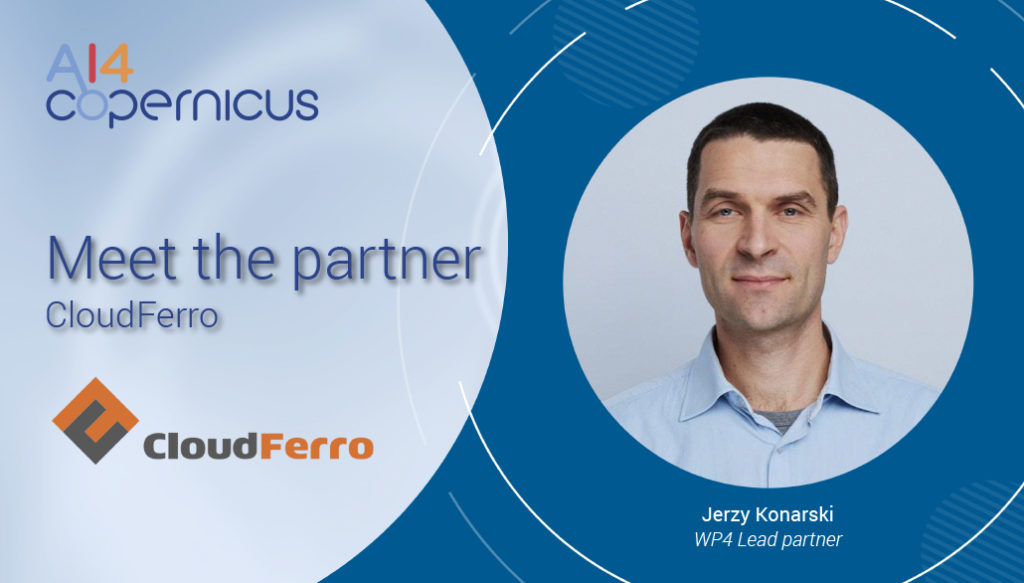
CloudFerro provides cutting-edge cloud services. The company delivers and operates cloud computing platforms for demanding markets, such as the European space sector, climate research and science. Its broad experience and in-depth expertise include storing and processing big data sets, such as multi-petabyte repositories of Earth Observation satellite data. CloudFerro operates two of five Copernicus Data and Information Access Services (DIAS), Creodias and WEkEO.
The company offers cost-effective, open-source-based, flexible cloud solutions in a public, private or hybrid model, customised to meet user needs. An extensive range of ancillary services and dedicated technical support is provided by the highly experienced local team of IT specialists with unmatched competencies.
CloudFerro has been trusted by leading European firms and scientific institutions from various big-data-processing market sectors, including the European Space Agency (ESA), EUMETSAT, the European Centre for Medium-Range Weather Forecasts (ECMWF), Mercator Ocean International, German Aerospace Centre (DLR), the EGI, to name a few.
Role in the project: In the frame of the AI4Copernicus project, CloudFerro with Mr Jerzy Konarski, leads the WP4 ‘Implementation, customization, integration and testing’, where a focus on infrastructure solutions connecting deliverables from AI4EU project to DIAS solution and data access for public users is made. The partner contributes also to six (6) other work packages in the project with high engagement to WP5 ‘Bootstrapping AI4Copernicus with high-impact services’.
Partner website: https://cloudferro.com/en/

